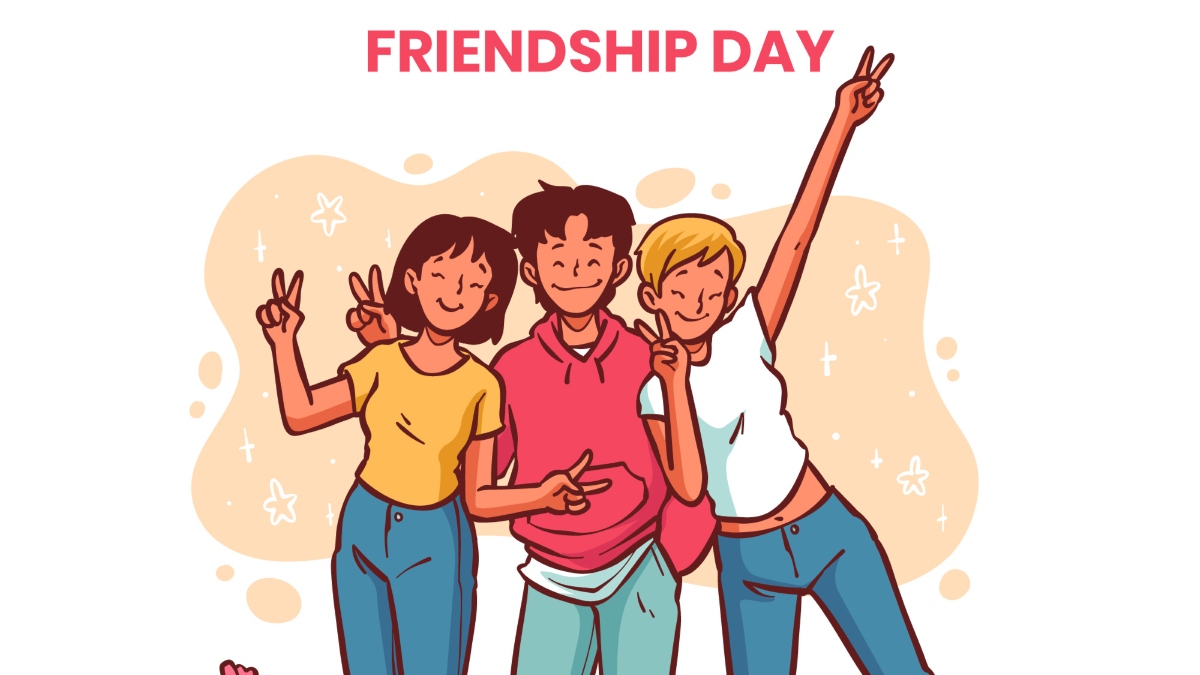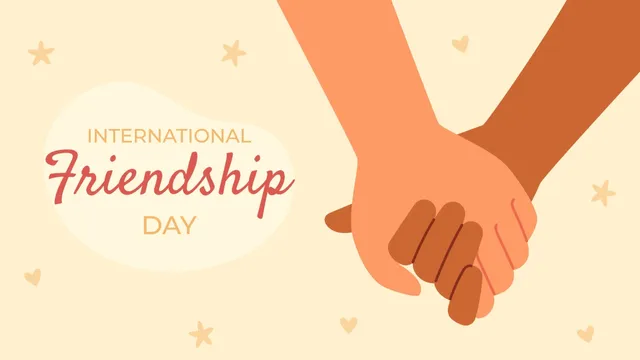- By Dr Sadhana Kala
- Mon, 04 Aug 2025 03:15 PM (IST)
- Source:JND
Every year, on the first Sunday of August, people across the globe pause to celebrate something as old as humanity itself — friendship. Friendship Day is not just about exchanging flowers, cards, or social media posts. It’s about honouring the invisible threads that tie people together, providing support, joy, and meaning in life. In a world often divided by boundaries, beliefs, and backgrounds, friendship stands as a universal language that speaks of kindness, loyalty, and trust.
A Brief History of Friendship Day
The origins of Friendship Day date back to 1930, when Joyce Hall, the founder of Hallmark Cards, proposed a day for people to celebrate their friends by sending them greeting cards. Initially, it was more of a commercial idea, but over the years, it evolved into a heartfelt celebration recognised in different ways around the world.
In 1958, Dr. Ramón Artemio Bracho from Paraguay proposed an “International Friendship Day” during a dinner with friends. This idea eventually reached the United Nations, which in 2011 proclaimed July 30 as the International Day of Friendship. Many countries, however, continue to celebrate it on the first Sunday in August — blending tradition with a personal touch.
Why Friendship Matters
Friendship is not merely an emotional luxury; it’s a human necessity. Research shows that strong social connections can boost mental health, improve physical well-being, and even extend life expectancy. Friends provide:
- Emotional support: They help us weather life’s storms, offering a listening ear or a shoulder to lean on.
- Perspective: Friends broaden our views and challenge our thinking.
- Shared joy: Happiness multiplies when shared with friends.
- Resilience: In tough times, friends are the safety net that keeps us from falling too hard.
In the age of digital connections, friendships have taken new forms. Online communities often become lifelines for people who might otherwise feel isolated. While some lament the decline of face-to-face interaction, technology has allowed friendships to flourish across continents.
Friendship in Different Cultures
Friendship has unique expressions around the world. In Japan, the concept of nakama refers to friends who are more like comrades — people you share deep bonds and experiences with, almost like family. In India, Friendship Day has become an immensely popular youth celebration, with colorful friendship bands tied around wrists as a token of connection. In parts of the Middle East, friendship is expressed through hospitality, long conversations over tea, and the tradition of always making time for those you care about.
These cultural variations show that while the way we celebrate friendship may differ, the sentiment behind it is universal.
The Changing Nature of Friendship
Friendships are not static. They grow, change, and sometimes fade. The friends we make in childhood often teach us about sharing and play. Teenage friendships bring lessons in trust, loyalty, and identity. Adult friendships, while sometimes harder to form due to work and family responsibilities, often provide the most profound sense of understanding.
In later life, friendships can be a lifeline against loneliness. Studies have shown that maintaining strong social bonds in old age can reduce the risk of cognitive decline and depression.

Friendships are not static. They grow, change, and sometimes fade. (Image: Freepik)
Friendship in the Digital Era
The internet has redefined how we connect. Social media platforms, messaging apps, and online gaming communities have made it easier to maintain friendships regardless of geography. A friend could be someone you met in school or someone you’ve never seen in person but speak to daily online.
Yet, digital friendship also comes with challenges. Online communication can sometimes lack the emotional nuance of face-to-face conversation, and social media can foster shallow connections rather than deep bonds. The healthiest approach is often to use digital tools to support — not replace — real-world interaction.
Friendship in Times of Crisis
True friendships often shine brightest during difficult times. During the COVID-19 pandemic, many people relied heavily on friends for emotional support through phone calls, video chats, or socially distanced meetings. In times of personal crisis — be it illness, loss, or hardship — friends become anchors, reminding us we are not alone.
History is full of examples of friendships that changed the world. Think of the partnership between C.S. Lewis and J.R.R. Tolkien, whose mutual encouragement led to some of the most beloved literature of the 20th century. Or the civil rights alliance between Martin Luther King Jr. and Ralph Abernathy, where friendship was intertwined with a shared vision for justice.
How to Celebrate Friendship Day
While there’s no single right way to mark Friendship Day, here are some thoughtful ideas:
1.Reconnect with old friends – Call or message someone you haven’t spoken to in a while.
2.Plan a gathering – A shared meal, a picnic, or even a virtual hangout can be an excellent way to reconnect.
3.Express gratitude – Write a heartfelt note or letter expressing what a friend means to you.
4.Do something kind – Acts of kindness, big or small, strengthen bonds.
5.Create new traditions – Whether it’s an annual trip, a shared hobby, or a friendship scrapbook, traditions keep memories alive.
Friendship Beyond Borders
In a globalised world, friendships often cross cultural, political, and linguistic lines. These connections can challenge prejudices, break down stereotypes, and build empathy. Friendships between people from different walks of life broaden our horizons and remind us of our shared humanity.
The United Nations’ emphasis on friendship as a tool for peace is rooted in this idea. When individuals build personal bonds across divides, it becomes harder for stereotypes and mistrust to take root.
The Science of Friendship
Neuroscientists and psychologists have long studied the dynamics of friendship. Our brains release oxytocin — often called the “bonding hormone” — during positive social interactions, which fosters trust and closeness. Dopamine, the brain’s reward chemical, also plays a role, making time with friends pleasurable on a neurological level.
Friendship even has tangible health benefits:
- Lower stress levels
- Improved heart health
- Better immune function
- Longer life expectancy
The Harvard Study of Adult Development — one of the longest studies on human happiness — found that close relationships, more than wealth or fame, are what keep people happy throughout their lives.
Friendship and Forgiveness
No friendship is without conflict. Disagreements, misunderstandings, and hurt feelings are inevitable. The strength of a friendship often lies in the ability to navigate these rough patches with honesty, empathy, and forgiveness. Holding grudges can corrode even the strongest bonds, but choosing to forgive often deepens the relationship.
Friendship and the Future
As society becomes more interconnected yet paradoxically more isolated, the importance of friendship will only grow. Technology will continue to evolve, offering new ways to connect. But at the heart of it, friendship will remain rooted in the same timeless values: trust, empathy, and shared experience.
For younger generations, there’s a growing recognition that friendships are as vital as family ties in shaping well-being. More workplaces are even encouraging a culture of friendship, recognising that strong bonds between colleagues can boost morale and productivity.
A Day to Reflect
Friendship Day is not just about celebration; it’s also about reflection. Who are the people who have shaped your life for the better? Have you told them what they mean to you? Are there friendships you’ve let drift that you’d like to revive?
It’s also a time to ask ourselves what kind of friends we are. Are we present, attentive, and trustworthy? Do we make time for our friends, even when life gets busy? True friendship is reciprocal — it thrives on mutual effort.
The Lasting Legacy of Friendship
Friendship leaves a lasting mark on our lives. Long after material possessions fade, the memories of shared laughter, late-night talks, adventures, and even struggles remain vivid. These are the moments that shape who we are and how we see the world.
On this Friendship Day, take a moment to celebrate the people who make your life richer just by being in it. Whether through a phone call, a handwritten letter, or simply sitting together in comfortable silence, show your appreciation.
Because in the end, friendship is one of the few treasures that becomes more valuable the more you give it away.
(Note: Dr (Prof) Sadhana Kala is a USA-trained robotic & laparoscopic surgeon, Uppsala University, Sweden, trained fertility specialist, Icon Endoscopic Surgeon of North India, and National Icon Endoscopic Surgeon of India. She is rated as India's Best Gynecologist by Google.)
(Disclaimer: The views expressed in this article are the personal opinions of the author.)

